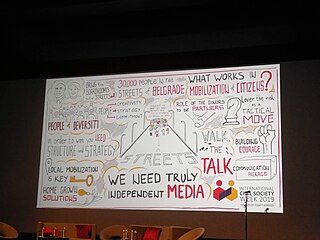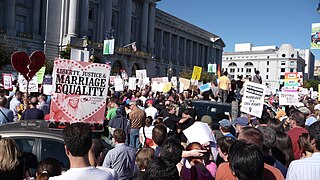Related Research Articles

Human rights are universally recognized moral principles or norms that establish standards of human behavior and are often protected by both national and international laws. These rights are considered inherent and inalienable, meaning they belong to every individual simply by virtue of being human, regardless of characteristics like nationality, ethnicity, religion, or socio-economic status. They encompass a broad range of civil, political, economic, social, and cultural rights, such as the right to life, freedom of expression, protection against enslavement, and right to education.

Civil society can be understood as the "third sector" of society, distinct from government and business, and including the family and the private sphere. By other authors, civil society is used in the sense of 1) the aggregate of non-governmental organizations and institutions that advance the interests and will of citizens or 2) individuals and organizations in a society which are independent of the government.
Good governance is the process of measuring how public institutions conduct public affairs and manage public resources and guarantee the realization of human rights in a manner essentially free of abuse and corruption and with due regard for the rule of law. Governance is "the process of decision-making and the process by which decisions are implemented ". Governance in this context can apply to corporate, international, national, or local governance as well as the interactions between other sectors of society.
The social market economy, also called Rhine capitalism, Rhine-Alpine capitalism, the Rhenish model, and social capitalism, is a socioeconomic model combining a free-market capitalist economic system alongside social policies and enough regulation to establish both fair competition within the market and generally a welfare state. It is sometimes classified as a regulated market economy. The social market economy was originally promoted and implemented in West Germany by the Christian Democratic Union under Chancellor Konrad Adenauer in 1949 and today it is used by ordoliberals, social liberals and modern (non-Marxist) social democrats alike. Its origins can be traced to the interwar Freiburg school of economic thought.
Democratic capitalism, also referred to as market democracy, is a political and economic system that integrates resource allocation by marginal productivity, with policies of resource allocation by social entitlement. The policies which characterise the system are enacted by democratic governments.
Governance is the overall complex system or framework of processes, functions, structures, rules, laws and norms born out of the relationships, interactions, power dynamics and communication within an organized group of individuals. It sets the boundaries of acceptable conduct and practices of different actors of the group and controls their decision-making processes through the creation and enforcement of rules and guidelines. Furthermore, it also manages, allocates and mobilizes relevant resources and capacities of different members and sets the overall direction of the group in order to effectively address its specific collective needs, problems and challenges.

Roberto Mangabeira Unger is a Brazilian philosopher and politician. His work is in the tradition of Western philosophy and classical social theory, and is developed across fields in legal theory, philosophy and religion, social and political theory, progressive alternatives, and economics. In natural philosophy he is known for The Singular Universe and the Reality of Time. In social theory he is known for Politics: A Work in Constructive Social Theory. In legal theory he was associated with the Critical Legal Studies movement, which helped disrupt the methodological consensus in American law schools. His political activity helped the transition to democracy in Brazil in the aftermath of the military regime, and culminated with his appointment as Brazil's Minister of Strategic Affairs in 2007 and again in 2015. His work is seen to offer a vision of humanity and a program to empower individuals and change institutions.
Africa's fifty-six sovereign states range widely in their history and structure, and their laws are variously defined by customary law, religious law, common law, Western civil law, other legal traditions, and combinations thereof.
The margin of appreciation is a legal doctrine with a wide scope in international human rights law. It was developed by the European Court of Human Rights to judge whether a state party to the European Convention on Human Rights should be sanctioned for limiting the enjoyment of rights. The doctrine allows the court to reconcile practical differences in implementing the articles of the convention. Such differences create a limited right for contracting parties "to derogate from the obligations laid down in the Convention". The doctrine also reinforces the role of the European Convention as a supervisory framework for human rights. In applying that discretion, the court's judges must take into account differences between domestic laws of the contracting parties as they relate to substance and procedure. The margin of appreciation doctrine contains concepts that are analogous to the principle of subsidiarity, which occurs in the unrelated field of EU law. The purposes of the margin of appreciation are to balance individual rights with national interests and to resolve any potential conflicts. It has been suggested that the European Court should generally refer to the State's decision, as it is an international court, instead of a bill of rights.

Tripartism is an economic system of neo-corporatism based on a mixed economy and tripartite contracts between employers' organizations, trade unions, and the government of a country. Each is to act as a social partner to create economic policy through cooperation, consultation, negotiation, and compromise. In Tripartism, the government has a large role in the economy and engages in negotiations between labour unions and business interest groups to establish economic policy.
Constitutional economics is a research program in economics and constitutionalism that has been described as explaining the choice "of alternative sets of legal-institutional-constitutional rules that constrain the choices and activities of economic and political agents". This extends beyond the definition of "the economic analysis of constitutional law" and is distinct from explaining the choices of economic and political agents within those rules, a subject of orthodox economics. Instead, constitutional economics takes into account the impacts of political economic decisions as opposed to limiting its analysis to economic relationships as functions of the dynamics of distribution of marketable goods and services.
The rule according to a higher law is a statement which expresses that no law may be enforced by the government unless it conforms with certain universal principles of fairness, morality, and justice. Thus, the rule according to a higher law may serve as a practical legal criterion to qualify the instances of political or economical decision-making, when a government, even though acting in conformity with clearly defined and properly enacted law, still produces results which many observers find unfair or unjust.
The following outline is provided as an overview of and topical guide to social science:
Elite capture is a form of corruption whereby public resources are biased for the benefit of a few individuals of superior social status in detriment to the welfare of the larger population. Elites are groups of individuals who, because of self-ratifying factors such as social class, asset ownership, religious affiliations, political power, historic discrimination among social groups, political party affiliation, or economic position, have decision-making power in processes of public concern. This specific form of corruption occurs when elites use public funds, originally intended to be invested in services that benefit the larger population, to fund projects that would only benefit them. This form of corruption is differentiated from outright criminal corruption such as embezzlement, misappropriation, or other diversion of funds by a public official.
International legal theory, or theories of international law, comprise a variety of theoretical and methodological approaches used to explain and analyse the content, formation and effectiveness of international law and institutions and to suggest improvements. Some approaches center on the question of compliance: why states follow international norms in the absence of a coercive power that ensures compliance. Other approaches focus on the problem of the formation of international rules: why states voluntarily adopt international legal norms, that limit their freedom of action, in the absence of a world legislature. Other perspectives are policy oriented; they elaborate theoretical frameworks and instruments to criticize the existing rules and make suggestions on how to improve them. Some of these approaches are based on domestic legal theory, others are interdisciplinary, while others have been developed expressly to analyse international law.

Social equality is a state of affairs in which all individuals within society have equal rights, liberties, and status, possibly including civil rights, freedom of expression, autonomy, and equal access to certain public goods and social services.
Institutional complementarity refers to situations of interdependence among institutions. This concept is frequently used to explain the degree of institutional diversity that can be observed across and within socio-economic systems, and its consequences on economic performance. In particular, the concept of institutional complementarity has been used to illustrate why institutions are resistant to change and why introducing new institutions into a system often leads to unintended, sometimes suboptimal, consequences.
Marxist philosophy or Marxist theory are works in philosophy that are strongly influenced by Karl Marx's materialist approach to theory, or works written by Marxists. Marxist philosophy may be broadly divided into Western Marxism, which drew from various sources, and the official philosophy in the Soviet Union, which enforced a rigid reading of what Marx called dialectical materialism, in particular during the 1930s. Marxist philosophy is not a strictly defined sub-field of philosophy, because the diverse influence of Marxist theory has extended into fields as varied as aesthetics, ethics, ontology, epistemology, social philosophy, political philosophy, the philosophy of science, and the philosophy of history. The key characteristics of Marxism in philosophy are its materialism and its commitment to political practice as the end goal of all thought. The theory is also about the struggles of the proletariat and their reprimand of the bourgeoisie.

Democratic confederalism, also known as Kurdish communalism or Apoism, is a political concept theorized by Kurdistan Workers Party (PKK) leader Abdullah Öcalan about a system of democratic self-organization with the features of a confederation based on the principles of autonomy, direct democracy, political ecology, feminism, multiculturalism, self-defense, self-governance and elements of a cooperative economy. Influenced by social ecology, libertarian municipalism, Middle Eastern history and general state theory, Öcalan presents the concept as a political solution to Kurdish national aspirations, as well as other fundamental problems in countries in the region deeply rooted in class society, and as a route to freedom and democratization for people around the world.

The Republic of Kazakhstan became a member of the United Nations on March 2, 1992. Kazakhstan was elected to serve on the UN Security Council for the 2017–2018 term. UN Secretary-General António Guterres in remarks to the UNSC recognized Kazakhstan's work to rid the world of weapons of mass destruction and global non-proliferation efforts.
References
- ↑ Anderson, Tim (2002). "The Political Economy of Human Rights". Journal of Australian Political Economy (50): 200–227.